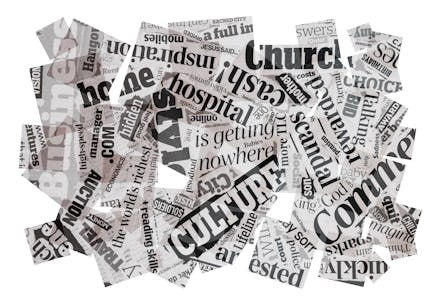How to keep up with the news without feeling hopeless

Staying informed with current events is daunting. There seems to be an overabundance of bad and scary news lately. It’s easy to feel apocalyptic about the state of the world when your social media feed is screaming doom. It’s tempting to hide or, conversely, to binge on information. I asked some mental health experts how to stay informed without feeling hopeless.
Aimee Daramus, a Chicago-based psychotherapist tells me that her clients often tell her they feel overwhelmed by politics. “‘Overwhelmed’ usually means that you’re taking on too much at one time,” she says. “That feeling means that you need to break something down into small, manageable pieces.” Yes. Overwhelmed is definitely how I feel about the current possibility of nuclear war. You too? Here are some strategies to help us deal.
Break your news consumption into manageable and intentionally chosen pieces
No one is saying that you shouldn’t keep up with what’s up; apathy is the opposite of what we need right now. This country values and needs calm educated activists who have both the information and resilience it takes to speak truth to power. “I don't recommend tuning out completely,” says says Stefani Goerlich, a Detroit-based psychotherapist. “It's a good practice to skim the headlines or to listen to a brief summary of the days news.
Consider subscribing to a daily news round-up style podcast, so you can catch up on the events of the day without diving too deep into overwhelming subjects.” This will ensure that you’re up-to-date, but not oversaturated to the point of getting overwhelmed. Daramus also suggests finding news sites that maintain high journalistic standards and avoiding news stories shared on social media unless they come from an outlet you respect.
You might also benefit from narrowing your news consumption down. “Pick one or two major areas to focus on, like health care, a recent disaster, or an election campaign,” she says. “It’s impossible to keep up on everything, so maybe give the news a quick scan and then focus most of your time on specific areas so you don’t get overwhelmed.”
So, in practice, you could listen to a news round up in the morning. I like NPR’s UpFirst. It’s usually about ten minutes and gives a basic-blow-by-blow of important happenings. Then you can follow up by reading an article or two about a topic that is of particular concern or interest to you. It may take some time to find a news strategy that works for you, but it will be worth your peace of mind.
And don’t forget there are good things happening in the world. “Make a point of seeking out positive news as well,” says Goerlich. “Sites dedicated to sharing the best of what's happening in the world right now are important resources. If you focus too much on the troublesome or overwhelming, it can start to feel like that's all that's happening.”
Keep an emotional inventory
Goerlich suggests checking in with how you feel before you turn on the radio, tv, or internet. “I think it's important to recognize the impact that the events of the day have on us — our stress levels, our blood pressure, our sense of purpose and hopefulness.” Daramus agrees. Notice how current events are impacting your emotional well being. “Helplessness and hopelessness are the worst,” Daramus says. “Do scans of your emotions to see where you’re at. When you start to feel numb or overwhelmed, let it go for a while.”
Goerlich also points out that it’s crucial to take the time to actually process all that we’re taking in. “When we don’t process, we react out of anger or fear and we’re more likely to do something stupid or cruel. When we don’t process, our thoughts and feelings are easier to manipulate.” In other words, what happens in the world is also happening to you and your body. If you don’t treat it as material that needs to be dealt with, it could erupt out of you in unpredictable ways or make you more susceptible to manipulation.
Commit to taking action in a realistic way
So many of us scroll incessantly end up in a hopeless pit of despair. But there is an antidote: recognizing and capitalizing on your own agency. Taking political or social action isn’t just good for the world, it’s also good for your mental health. “Don't only ask yourself how the news makes you feel. Ask yourself what you can do about what you've heard,” Gorlick says. Perhaps you have two minutes to text a donation to RAICES after hearing a story about child detainees. You can call your congressperson on your lunch hour. You can text a friend an article. Combining reflection with action is the key to managing our emotions during turbulent times.”
Taking small action steps can inject a little hope into your state of mind and serving as a coping skill that combats helplessness. “FEMA and the Red Cross offer free or inexpensive disaster relief training, and a lot of organizations are offering classes on how to be politically effective. Just educating yourself can leave you feeling stronger.” In other words, you do not have to sit by passively when bad things are happening. You can do something. Make a call. Send a text. Organize a petition campaign. Anything, big or small, can be a win for all parties involved.
Reward yourself for staying engaged
Being politically aware doesn’t mean you don’t get to have any fun. It may mean that you have to be intentional about having a good time, though. “If you’re losing the ability to feel pleasure, do these things anyway to remind the pleasure pathways in your brain how they work. Paying attention when you feel pleasure helps you get the most out of it,” she says.